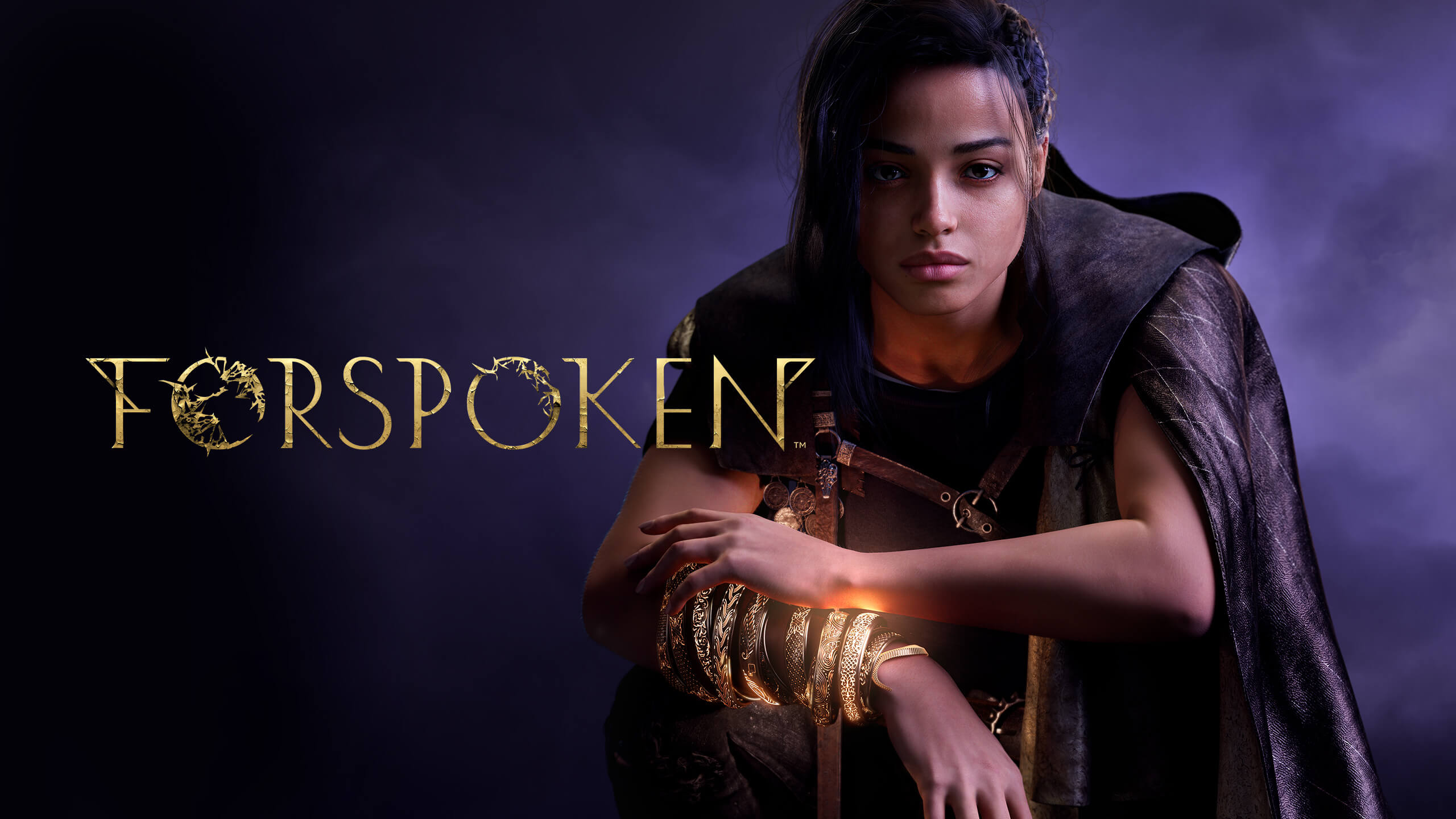Interview
ForSpeaking About The Music Of “Forspoken,”
With Garry Schyman
Written By: Gbanas92
Published On: February 11th, 2023
Your Journey is just beginning
The new open-world title from Square Enix’s in-house team Luminous Studios has arrived! Forspoken is a fantasy-action RPG that sees players take the mantle of Frey, a woman transported from, the streets of New York City to the fantasy world of Athia. The title is out now, and what better way to celebrate than with an interview? We had the chance to sit down with one of the game’s composers, Garry Schyman – perhaps best known for his work on the Bioshock franchise.
In the following paragraphs, we’ll wax poetic about the collaborative nature of working on Forspoken’s music, the rigors of blending hip-hop beats with a more traditional orchestral score, and the many memorable moments of hip-hop in the original Bioshock! Join us here at Utopia District as we go on an adventure alongside Frey!

Utopia District: On Forspoken, you collaborated with fellow composer Bear McCreary. From your perspective, I’m curious how you’d describe your collaborative effort [with Bear McCreary] [working on Forspoken]. What’d you work on together? Separately?
Garry Schyman: We collaborated particularly in our approach to the score. We started together, talking with Luminous Productions, Luminous, part of that Square Enix world. They were describing the game to us… we were Zooming with them, and then we had some conversations about it. And then he did some themes, I did some themes, and then I was pretty much on my own after that. Our minds came together, and we agreed on our approach to the score. I actually wound up using some of [Bear’s] themes, he wrote some beautiful themes.
UD: So you used some of his themes to craft new pieces of music around?
GS: Yes! He wrote Frey’s (Forspoken’s Protagonist) theme, so when I needed to, I would utilize that.
UD: How did working on Forspoken differ for you? Either because of that collaborative element or just in general.
GS: Bear and I are friends, so it went very smoothly. Once he did his thing, he pretty much had other stuff to work on, so I continued and wrote two and a half hours of score, and wrote cutscenes. I have collaborated before though, on Shadow of Mordor, and Shadow of War, for Monolith. But that was with their in-house composer, Nathan Grigg, and that was a great collaboration. Went very smoothly.
[Smooth collaboration] happens more in video games I think. In film, it’s more likely that a big-name composer gets a project and divides it up among their minions. That may happen in games as well, but I’ve never done that. But in this case, we both did our parts.
Someone once joked to me, a very successful mixer, an engineer, that the difference between game composers and film composers, is that game composers actually write their own music. [Laughs]
Now, that’s certainly not true of every game composer, it’s unfair to them, but I’m just you know, passing along the joke! In some instances, there’s probably a bit of truth to that. But yeah, working with Nathan was fantastic. And on Metamorphosis (a game I’ve actually previously talked with Garry about) I worked with Mikolai Stroinski (likely best known for scoring The Witcher 3: Wild Hunt), so I’ve had these collaborations. In games, we often have these music requirements that can be many hours. So it can [make sense to collaborate].
A few months ago, someone told me that they were writing eight hours of music for a game. And I was like “really!?” To me, that sounds more like…time at San Quentin [State Prison] [Laughs].
UD: Yikes. Eight full hours? Or just a number of cues that could be turned into eight hours of music?
GS: I didn’t drill down. I was just too taken aback. That’s a lot of music. Sounds more like an in-house type job, where you’d be working on cranking out music all the time for various things. I would not be interested in that. Well…unless they paid me something stupid. If they pay me some ridiculous rate, I guess I would. Then I could hire some minions to help out! I think I’m good for 2-3 hours per game, but by then I think I’d have said everything I wanted to say musically. As you know, games can be very long, 30, 40 hours. Or more! Sandbox games, or MMO’s and you can play them for years. But say make an 8-hour combat cue, that sounds horrible.
UD: Or an 8-hour character theme!
GS: Right! [Laughs]
Well, there’s a piece by Erik Satie, a French composer from the early 1900s, late 1800s. He wrote a piano piece, it’s not terribly long, but then he said “repeat 150,000 times” or something. Maybe 10,000. I forget, but recently, or maybe 5, 10 years ago, there was a performance of it. And there were multiple pianists, and they played over 4 days or something, and they played the piece as many times as the piece dictated.
The piece in question is “Vexations,” written in 1893. In this piece, a series of chords are played, followed by the instruction to repeat them 840 times. Performances can often be upwards of 35 hours, leaving the interpretation of the tempo mark of “very slow” as a deciding factor.
UD: For this next bit, I’m curious about how you captured the mystery present in Forspoken. In all the marketing hype, interviews, etc. there is a great emphasis on speed and fluidity in combat. And in context, you could construe that as rhythm. On your end, how did you go about capturing that in the music? Did it have an influence at all?
GS: No, I think the combat music is there to inspire you, maybe make you anxious. So I would say, I would take what a particular battle was. Each battle was unique, related to who you were fighting, what was going on. Each one had a specific feeling. So that played a greater role in directing me, more what influenced me creatively.
UD: From what I understand, Frey starts in New York at the beginning of the game before being transported to [Athia] and to me that feels like it could introduce an interesting dichotomy of elements. You could start with something more terrestrial, before transitioning into this more bombastic fantasy world. Is that something you leaned into with the score, or experimented with?
GS: Absolutely! I think there is a differentiation between New York, which is a relatively modest part, maybe 5% of the game takes place in New York, it’s a long game. So that definitely exists. But it seemed to me that it made the most sense to play with. Still definitely use some orchestra, but it also had to have some beats, some street vibe to it. So definitely that was influential in how New York was portrayed, or at least the music that we heard.
That said, there are also some cinematics that take place in New York, and they’re very empathetic to a difficult situation that [Frey] is going through. So those moments did not need a beat. And we hired a wonderful singer named India Carney, and she sang, vocalized in those areas, and even did some improvisation as well.
UD: Was there a concerted effort to include themes or elements from the New York music and carry it forward in a way? Transform it? Or did you want to keep the music of New York and Athia separate?
GS: There are definitely some shared themes if they were relevant to Frey’s character. As long as it was something relevant to Athia, the world that she enters. So there’s some of that. But if you heard a cue, usually you could go “ehh, that’s New York,” you know? Except for those cinematics, where there was this very sympathetic, sad element. And those were scored in a more, you might say, “traditional” way.
UD: Okay, so I’m actually glad you brought up India Carney because I had a question about that! I was curious about the hip-hop elements of the score, as well as India’s involvement with the music. Hip hop isn’t a terribly common soundscape you’d hear in games, it does show up, but not frequently. Was that chosen in large part because of New York, tied to the identity of the city?
GS: Yeah, it felt like an appropriate beat for the city. She’s a young black woman in New York, and she’s dealing with things that have a very “street” vibe. And it felt more authentic. Not that I’m a hip-hop artist. Although maybe you know me by my hip-hop name. Kidding! [Laughs]
But yeah, I’m not a hip-hop artist, but it’s easy to obtain some beats, loops. And that’s what many hip-hop artists use too, they use loops. And then to write over them, score over them. To combine orchestra and hip-hop, it can work quite nicely! And then if you have some as soulful as India singing over that, it’s quite a lovely combination.
And I wrote some melodies for India, but then when she came into the studio, I asked if she could improvise too and she said “Yeah! I’d love to!” And those are wonderful moments as well where she just has the chord changes and she does some beautiful stuff.
UD: That hip-hop element, have you worked with that previously in any capacity? Or is that brand new?
GS: Nope! That’s brand new! Although there’s a lot of hip-hop in Bioshock if you recall!
UD: Ah yes! One of my favorite games of all time. I distinctly remember all the hip-hop at Fort Frolic!
GS: Exactly! All that rapping.
UD: Sander Cohen loves it!
GS: Evil rapping! Cohen’s master rap.
But yeah it is new to me. But I’m often doing things that are new to me. And that’s one of the things that I love about being a scoring composer. Because I am constantly being challenged to write in ways I’ve never written before. To me, that’s one of the things that makes this job so cool, and so interesting and so challenging. We’re in such an eclectic time, musically. Hundreds of different styles. I don’t even know how many Grammy categories. There are probably plenty that don’t get attention still (like vaporwave! -Ed).
UD: And now they’re finally paying attention to games! At long last!
GS: Indeed! I was interviewed by the Sunday Morning Show with Jane Pauley, I’ll be on that the morning of February 5th, the day of the Grammy’s, and they were interested because I teach a class at USC on scoring for video games!
UD: Oh, wow that’s cool!
GS: But they came out, visited my class, and interviewed me. They interviewed me for a half hour, I’ll probably be on screen for 3 seconds. But in any event, that is a cool and wonderful thing. Games are finally being recognized for the quality of their music. But that acknowledgment is still way behind where it should be.
UD: Oh, absolutely! I’ve been writing about game music for almost a decade? And in that time, it’s been so frustratingly underrepresented. Even though, game music is oftentimes more impactful and interesting than film or television. Those have a rigid structure, but games afford so much more room for dynamicism and room to expand. And the Grammy’s what, they gave games 2 nominations before this? [Austin Wintory’s] score for Journey, and then [Christopher Tin’s] main theme for Civilization IV? And that’s it.
GS: But at least it’s a start. It’s finally become a category though, and it’s wonderful. Let’s celebrate that! Let’s take what we can. Take the breadcrumbs out of that and make meatloaf. They use breadcrumbs in meatloaf, right?
UD: I’m pretty sure. [Laughs]
So to get back to India’s involvement quick. When was she brought in? Was that the plan from the beginning?
GS: Early on yeah! I used her on my first cue, and Bear used her on his theme for Frey, and she was amazing. She did such a great job, and I loved her sound so much. She brought a lot to the table. If I didn’t think she was great, I wouldn’t say anything, but she was amazing. We talked about Metamorphosis earlier, Joanna Freszel, who did the sprechgesang for the game (a style of music that offers dramatic fluctuations between traditional song and something closer to regular speech) brought so much to the table. When people add that element to a score, we’re so lucky. I love doing that. I love hiring people and having them come and add their unique skills.
UD: How did India explicitly get involved? Did one of you have her in mind?
GS: So Bear contacted a PR Contractor. One that hires musicians, and she was recommended to us. She also sings in choirs actually! So she has a legit, or a “traditional” choir sound. She can read music too. There are people who can sing really beautifully, but they can’t read music. India can read music, she can improvise, she can do it all! She brought a lot to the table. Very adaptable. She sings perfectly in tune too. That’s not always the case. You’d be shocked how many times we’ve had to digitally tune singers. But that wasn’t the case here. She was right on the money!
UD: Well, that was my last question for you! Thank you for taking the time!
GS: It was my pleasure!

And there we go! A pulling back of the proverbial curtain. A glimpse at the intense world of crafting video game music! If you enjoyed the interview, please check out the game! And the music!

